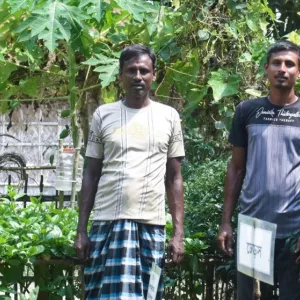Sustainable Homestead Farming for Better Food and Nutrition Security in Bangladesh: Farida Begum’s success story
Bushra Humaira Sadaf This article highlights Mrs. Farida Begum’s success in improving food security, nutrition, and income through integrated year-round homestead vegetable farming. SHAHBAJPUR, BANGLADESH, October 14, 2024 – Mrs. Farida Begum, a 45-year-old mother of three, lives in Shahbajpur, Rangpur Sadar, Rangpur District in northwestern Bangladesh with her family. Together, they manage a 3.5 acre main crop field,

Sustainable Homestead Farming for Better Food and Nutrition Security in Bangladesh: Farida Begum’s success story
Bushra Humaira Sadaf
This article highlights Mrs. Farida Begum’s success in improving food security, nutrition, and income through integrated year-round homestead vegetable farming.
SHAHBAJPUR, BANGLADESH, October 14, 2024 – Mrs. Farida Begum, a 45-year-old mother of three, lives in Shahbajpur, Rangpur Sadar, Rangpur District in northwestern Bangladesh with her family. Together, they manage a 3.5 acre main crop field, where they cultivate rice, maize, sugarcane, and mustard. Besides, the family has a 2.5 decimal homestead area next to the house. While her husband primarily manages the field crops, Mrs. Farida and her children have taken the lead in transforming their homestead garden into a thriving year-round source of vegetables and fruits, thanks to the excellent support of the CGIAR Initiative on the Sustainable Intensification of Mixed Farming Systems (SI-MFS).
The SI-MFS Initiative has been supporting over 9,000 smallholder farmers, especially women, in northern and southern Bangladesh for sustainable intensification of homestead gardens since 2022. With SI-MFS staff’s guidance, Farida Begum is now following a year-round vegetable production model called “Saidpur Model”. In open sunny areas, she plants radish, brinjal, tomato, and leafy vegetables during the Rabi Season (October-March), followed by red amaranth, okra, and leafy vegetables in the Kharif seasons (April-September). She uses garden fences and the roof of her house for beans, bottle gourds, ridge gourds, ash gourds. production. Her backyard is filled with fruit trees like papaya and banana, while shaded areas host ginger. She also grows chili and other greens throughout the year. Mrs. Farida utilizes kitchen wastes, cow dung, and compost in the homestead garden. After the SI-MFS intervention, the previously underutilized homestead garden is now intensively cultivated with different vegetables and fruits. This diverse planting ensures a steady supply of nutritious produce for her family, and…

